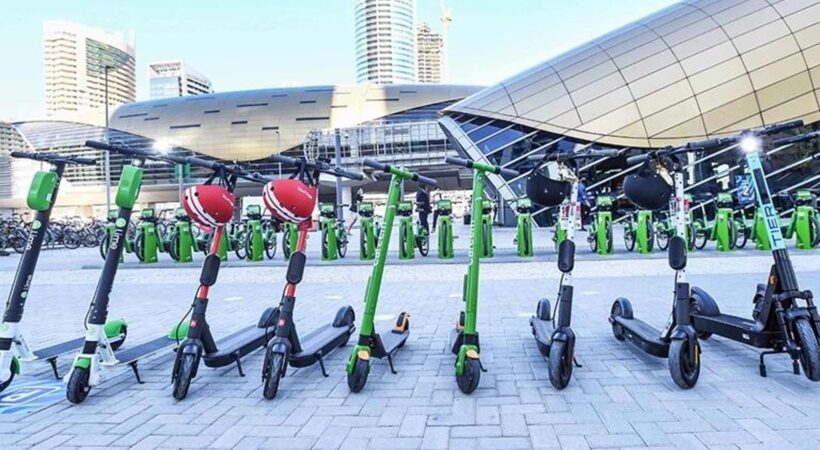Now, it is mandatory to have a driving license to ride an e-scooter in Dubai. According to the new law, riders below 16 years of age will not be permitted to ride an electric bike or scooter. Also, those below 12 years must be accompanied by an adult cyclist.
Dubai’s Crown Prince Sheikh Hamdan bin Mohammed stated that the speed limits for cyclists on roads have been set at 60 km/h. The new rules will increase the overall safety of the riders and road users.
The new rule comes as part of a wider announcement of a series of laws for alternative modes of transport.
According to a statement shared on the crown prince’s website, Dubai transportation authority RTA will issue licenses for “electric-scooters or any other form of bikes in accordance with the decisions issued by RTA’s Director-General, Chairman of the Board of Executive Directors.”
Until now, e-scooters could only be utilized in five Dubai neighbourhoods during the trial period. RTA intends to expand e-scooter use and tracks to include specified residential areas and 23 more districts in the future.
Sheikh Mohammed bin Rashid Boulevard, Jumeirah Lakes Towers, Dubai Internet City, Al Rigga, 2nd of December Street, The Palm Jumeirah, and City Walk are included in the first phase. It also included safe roads in the communities of Al Qusais, Al Mankhool, and Al Karama.
To avoid mishaps, the RTA has asked the public to refrain from riding electric scooters on rails that are currently under construction. RTA stated that the infrastructure for e-scooters in new districts is progressing as planned. The installation of traffic and directional signs for e-scooters is nearly complete.
Group cycling
Group cycling with over four riders requires RTA approval with Dubai Police, Dubai Sports Council, UAE Cycling Federation and Dubai’s Ambulance Services notified ahead of the session.
A safety vehicle with a front and rear-facing camera must accompany group riders, clarified the statement. Reflective vests and helmets continue to be mandatory.
E-Scooter Safety Requirements
The e-scooter is allowed to operate only on authorized tracks within stringent limitations.
Both the rider and the renter must follow the RTA’s rules and regulations, which are in line with the traffic laws.
They regulate the usage of e-scooters and the traffic safety requirements linked with them, such as the wearing of a protective helmet.
The e-scooter must be parked in designated areas and not in areas that cause traffic congestion.
Riders must exercise caution and avoid endangering other road users.
Riders must follow all directions and restrictions pertaining to the locations where e-scooter riding is authorized, as detailed in the apps created for operators.
Cyclists should not ride on jogging or walking tracks.
Reckless practices that can endanger safety, such as hooking a vehicle while biking, are prohibited.
One-handed cycling and biking should be strictly avoided except when riders need to use their hands for signalling.
Reflective vests and helmets are a must for cyclists and bikers.
Carrying passengers on bicycles and electric bikes is not permitted unless the bikes have separate seats for them.
Cyclists and bikers should always ride on the right side of the road. Before changing their lane, they should give hand signals and ensure they can make their move safely.
Making major modifications to the bike is not permitted.
Bikes should be fitted with a white headlamp in front and a red one and a red reflector in the rear.
They should have a bell fitted on the steering wheel and brakes on the front and rear tyres.
The tyres should be proportional to the size of the bike and fit for use on the roads and cycling tracks designated by the RTA.
The size of the bike used should also be proportional to the size of its rider, according to the resolution.
Bikers should ensure they maintain a safe distance from other vehicles and pedestrians.
They should also ensure that the bikes are parked in designated spaces (if any). Parking in non-designated areas and causing obstructions to vehicles, pedestrians and users of public spaces is strictly prohibited.
Penalties
Failure to adhere to laws and regulations governing cycling and biking or endangering the safety of other cyclists, vehicles and pedestrians can bring penalties.
These include confiscation of a bike for 30 days, in case of repeat violations within a year of the first violation and bans on riding the bike for specific periods.
In case the violation is committed by someone under 18, his or her parent or legal guardian will be responsible for paying any fine. Failure to pay the fine will lead to confiscation of the bike.
The new rules are expected to increase the overall safety for the riders and road users, in addition to bettering public health
The move will have implications for e-scooter rental companies, which allow riders to pick up the bikes from docking stations and hop on and off with ease.
Authorities have not clarified whether tourists would be able to use e-scooters or not.



















